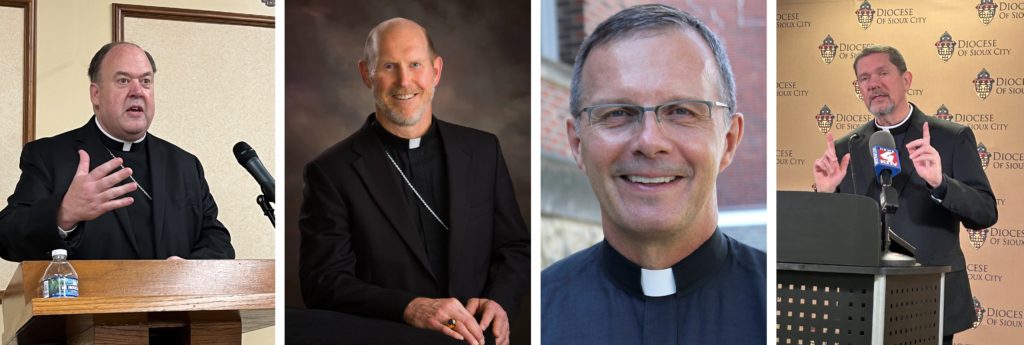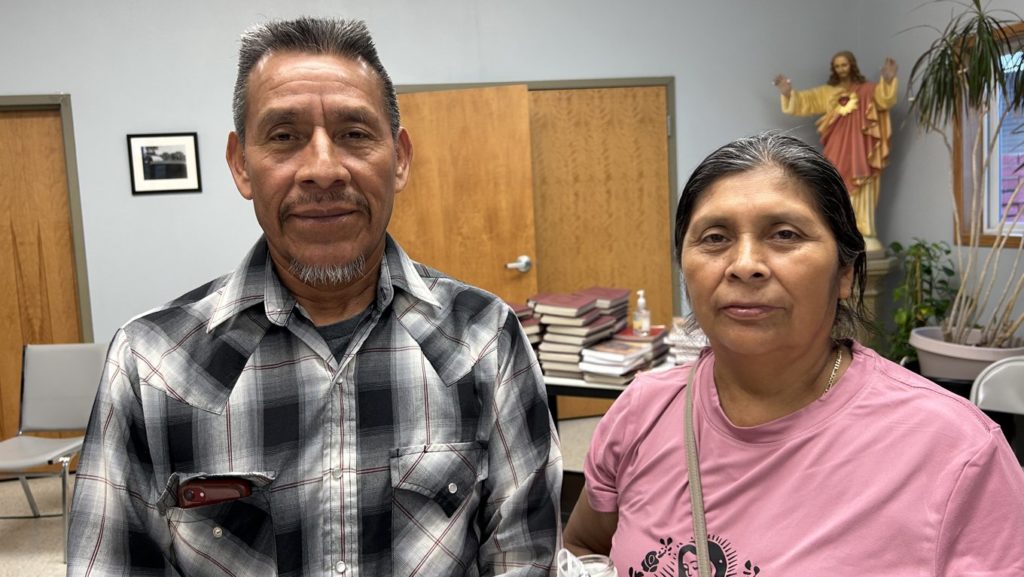A pastoral reflection on immigration from the Iowa Catholic bishops aims to present church teaching in a way that "transcends" political rhetoric and "fear and false narratives" about the issue often found in secular and social media, Bishop Dennis G. Walsh of Davenport said.
"Our response to those seeking refuge and stability in hope is not only a reflection of our nation's founding values, but is primarily a testament to our fidelity to Christ," said Archbishop Thomas R. Zinkula of Dubuque; Bishop William M. Joensen of Des Moines; Bishop John E. Keehner of Sioux City; and Bishop Walsh.
The reflection, titled "Pilgrims of Hope: A Pastoral Reflection on Immigration," was released Aug. 22 by the Iowa Catholic Conference, the public policy arms of the bishops.
"The Catholic Church has always proclaimed the inviolable dignity of the human person, created in the image and likeness of God," they said. "Governments do not bestow this dignity, nor does legal status instill it, but it is intrinsic to every human person as a beloved child of the heavenly Father."

The Catholic Church has always affirmed the "right to migrate," the bishops wrote, citing St. John XXIII's 1963 encyclical, "Pacem in Terris" ("Peace on Earth") The pope, they said, "taught that 'every human being has the right to freedom of movement and of residence within the confines of his own state. When there are just reasons in favor of it, he must be permitted to migrate to other countries and take up residence there.'"
The nation has a right to regulate its borders, the bishops said, but "the security of a nation can never be used as an excuse to violate the dignity and human rights of migrants, including the right to due process by law."
At a time when political rhetoric often generates division and fear, especially over immigration, "the Church stands as a beacon of God-given hope," they said.
"Immigration is not merely a political or economic issue; it is a deeply moral matter that calls for a response rooted in faith, justice, and mercy. Sacred Scripture consistently reveals God’s care for the immigrant and the refugee," the bishops said.
"'Pilgrims of Hope' is intended to serve as a guide for the faithful, providing clear and authentic Catholic perspective on the complex issue of migration," Bishop Walsh told The Catholic Messenger, Davenport's diocesan news outlet. "The letter seeks to present the church's teaching in a way that transcends the political rhetoric often found in secular and social media, which can focus on fear and false narratives."
A "Catholic perspective on immigration must always begin with the inherent dignity of each person. The letter affirms that the rights possessed by every individual are intrinsic to the human person and cannot be disregarded for political expediency," Bishop Walsh said. "The pastoral letter is not just another voice in the debate; for Catholics, the magisterial teaching of the church holds a privileged position as it presents the authentic and perennial teaching of the church."
"Every Catholic Christian has a moral responsibility to ensure that the personal dignity of migrants is upheld," the pastoral said. "This responsibility includes personal dispositions rooted in the truth of the Gospel with its call to love our neighbor as we love ourselves."
Some Catholics are asking, "What does the pastoral reflection want us to do?"
It "seeks to engage Catholics on a deeper level, beyond sound bites and political rhetoric," Bishop Walsh said. "The teaching of the church is not opinion" but is "authoritative," he said, and this teaching -- not the "political platforms of both parties" -- should be used to help Catholics "appropriately form their consciences."
"The church does not advocate for open borders," he continued. "A government has a duty to ensure that its citizens are protected. When people commit serious and sometimes violent crime, the government should and must act in those situations for the protection of society. However, the vast majority of those who have been here peacefully have adjusted well to life in the United States. Perhaps a pathway should be found for them to legalize their status."
"Meaningful change comes not through ‘quick fixes' but through long-term dedication to advocacy, hospitality, and accompaniment," the pastoral stated. "The call to welcome the stranger challenges us to move beyond comfort and convenience, embracing a spirit of encounter that reflects the heart of the Gospel."
"The bishops of this country have been engaging in the legislative process for many years for important immigration reform," Bishop Walsh told The Catholic Messenger. "However, there does not really seem to be the political will or desire to fix the problem. It seems that politicians prefer to keep the problem for their political purposes rather than find real solutions."
"First and foremost," the pastoral reflection stated, "prayer must guide our personal and collective responses, asking God for the prudence to enact just policies and the grace to see Jesus in the faces of those seeking a better life."

